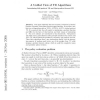Free Online Productivity Tools
i2Speak
i2Symbol
i2OCR
iTex2Img
iWeb2Print
iWeb2Shot
i2Type
iPdf2Split
iPdf2Merge
i2Bopomofo
i2Arabic
i2Style
i2Image
i2PDF
iLatex2Rtf
Sci2ools
125
click to vote
CORR
2006
Springer
2006
Springer
A Unified View of TD Algorithms; Introducing Full-Gradient TD and Equi-Gradient Descent TD
This paper addresses the issue of policy evaluation in Markov Decision Processes, using linear function approximation. It provides a unified view of algorithms such as TD(), LSTD(), iLSTD, residual-gradient TD. It is asserted that they all consist in minimizing a gradient function and differ by the form of this function and their means of minimizing it. Two new schemes are introduced in that framework: Full-gradient TD which uses a generalization of the principle introduced in iLSTD, and EGD TD, which reduces the gradient by successive equi-gradient descents. These three algorithms form a new intermediate family with the interesting property of making much better use of the samples than TD while keeping a gradient descent scheme, which is useful for complexity issues and optimistic policy iteration. 1 The policy evaluation problem A Markov Decision Process (MDP) describes a dynamical system and an agent. The system is described by its state s S. When considering discrete time, the age...
CORR 2006 | Education | Markov Decision | Policy | Policy Evaluation |
| Added | 11 Dec 2010 |
| Updated | 11 Dec 2010 |
| Type | Journal |
| Year | 2006 |
| Where | CORR |
| Authors | Manuel Loth, Philippe Preux |
Comments (0)

